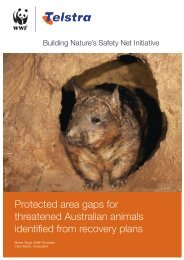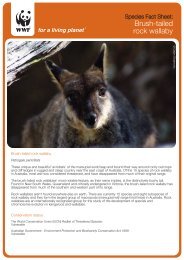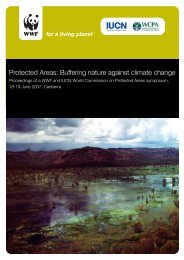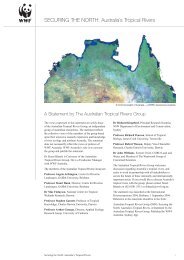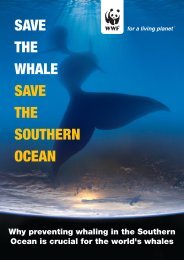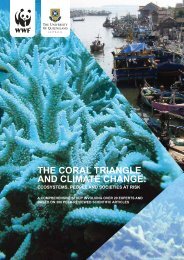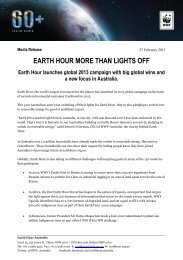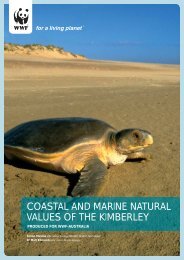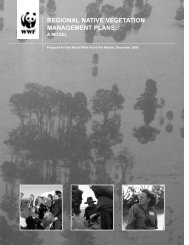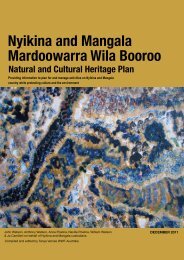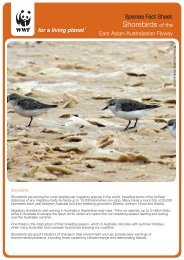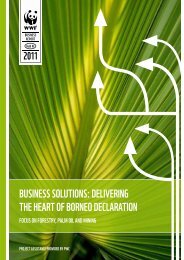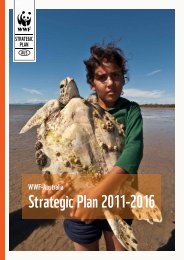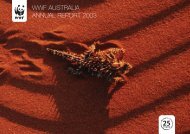Jenny has compared <strong>the</strong> relative efficacy <strong>of</strong> remote cameras, cage traps and hair-tubes for collecting broad-scale surveydata for monitoring spotted-tailed quoll populations in Victoria. Remote cameras were <strong>the</strong> most cost-effective <strong>of</strong> <strong>the</strong>three techniques and allow researchers to collect data concurrently on introduced carnivores. Cage traps have a similarprobability <strong>of</strong> detection to remote cameras. However, <strong>the</strong>y are invasive and not cost-effective. Hair tubes provide a highprobability <strong>of</strong> detection (when a grid <strong>of</strong> 20 widely spaced tubes are used) but <strong>the</strong>y are also not cost-effective.Jenny emphasised that <strong>the</strong> use <strong>of</strong> appropriate field and analytical methods in assessing and monitoring populationsis critical. She suggested seeking biometric help. Assessing and monitoring populations requires careful planning andimplementation and an appropriate level <strong>of</strong> fundingJenny also noted that community involvement requires significant support to work.PlenaryThe following points were raised in <strong>the</strong> plenary session:Remote cameras cost approximately $500 each.When surveying particular target areas, <strong>the</strong> data can only be used to make inferences about o<strong>the</strong>r similar areas and not<strong>the</strong> broader landscape. If particular habitats are considered to be more important than o<strong>the</strong>rs, it is best to stratify <strong>the</strong>survey area based on habitat, and <strong>the</strong>n sample randomly within each stratum.Scott Burnett, University <strong>of</strong> <strong>the</strong> Sunshine Coast/Wildlife Preservation Society QueenslandConserving <strong>Quoll</strong>s – The Community ConnectionScott provided an overview <strong>of</strong> <strong>the</strong> definition and role <strong>of</strong> <strong>the</strong> community in conservation. He defined <strong>the</strong> communityto include landowners and managers, from both small and large agricultural holdings, non-government organisationconservation groups and indigenous groups, as well as <strong>the</strong> wider community. There are a range <strong>of</strong> practical things that<strong>the</strong> community can do to mitigate threats to quolls. The role <strong>of</strong> <strong>the</strong> community can include providing an informationsource about quolls and <strong>the</strong>ir threats, volunteer effort (such as <strong>the</strong> <strong>Quoll</strong> Seekers Network), implementation <strong>of</strong> on-groundconservation efforts by landowners and managers and managing captive populations.In relation to threats, quoll populations are inherently sensitive to elevated mortality or decreased fecundity. Because <strong>the</strong>yare a top order predator and opportunistic scavenger with wide roaming capabilities, quoll behaviour <strong>of</strong>ten puts <strong>the</strong>m indangerous situations in <strong>the</strong> human landscape. For example, quolls are known to attack domestic chickens, which is <strong>of</strong>tena source <strong>of</strong> conflict with people. A single chicken pen can be a sink for quolls from an area <strong>of</strong> 113 km2.A number <strong>of</strong> actions were suggested to assist with protecting quoll populations, such as raising community awareness<strong>of</strong> quolls and conservation actions for land-owners and developing <strong>the</strong> community’s capacity to act for quolls throughawareness raising, monitoring, advocacy, and practical quoll conservation. The importance <strong>of</strong> providing continuity <strong>of</strong>support for community actions, through provision <strong>of</strong> moral and technical support and adequate funds was emphasised.Additionally, <strong>the</strong> pros and cons <strong>of</strong> a captive industry could be explored fur<strong>the</strong>r.PlenaryThe following issues were discussed following <strong>the</strong> presentation:Community leadership attitudes can be a barrier to quoll conservation, for example where a local Mayor may be hostiletowards <strong>the</strong> issue.We cannot underestimate <strong>the</strong> value <strong>of</strong> talking to school groups, which has a significant influence on <strong>the</strong>ir parents. Thepublic would also greatly benefit from <strong>the</strong> opportunity to physically interact with quolls.In most situations <strong>the</strong> reserve estate is probably not large enough to fully support quoll populations, and <strong>the</strong>reforeadjacent private lands are critical to <strong>the</strong> future conservation <strong>of</strong> quolls.14
Rose Singadan, Papua New Guinea Department <strong>of</strong> Environment and ConservationConservation and New GuineaTwo key challenges to conservation in general in New Guinea are introduced species (such as rats) and <strong>the</strong> laws <strong>of</strong> <strong>the</strong>people. There are three main legislative tools for conservation in New Guinea: <strong>the</strong> National Parks Act, Fauna ProtectionControl Act and Wildlife Areas and Conservation Areas Act.The main role <strong>of</strong> Non-government Organisations (NGOs) in New Guinea is that <strong>of</strong> an integrated community aid anddevelopment group ra<strong>the</strong>r than acting for species conservation. NGOs can experience significant conflict if expectationsin <strong>the</strong> community are raised high and not fulfilled, for example in cases where financial gains are not forth coming aspromised. It is <strong>the</strong>refore essential that species action translates into something tangible for <strong>the</strong> community, such as jobs,money or materials.Key barriers to wildlife conservation in New Guinea include land tenure arrangements, as <strong>the</strong> sea and land belongs to<strong>the</strong> people and not <strong>the</strong> government. As a result, it is difficult to manage <strong>the</strong> Wildlife Management Areas (WMAs), as <strong>the</strong>yare controlled by <strong>the</strong> local people and not <strong>the</strong> government. O<strong>the</strong>r barriers include politics (which are regularly changing),social issues (particularly relating to logging, mining and poor communications), lack <strong>of</strong> resources and lack <strong>of</strong> capacity tomanage funds and inconsistency <strong>of</strong> conservation research in <strong>the</strong> region.Spotted-tailed quoll © <strong>WWF</strong>/Frédy MERCAY15



